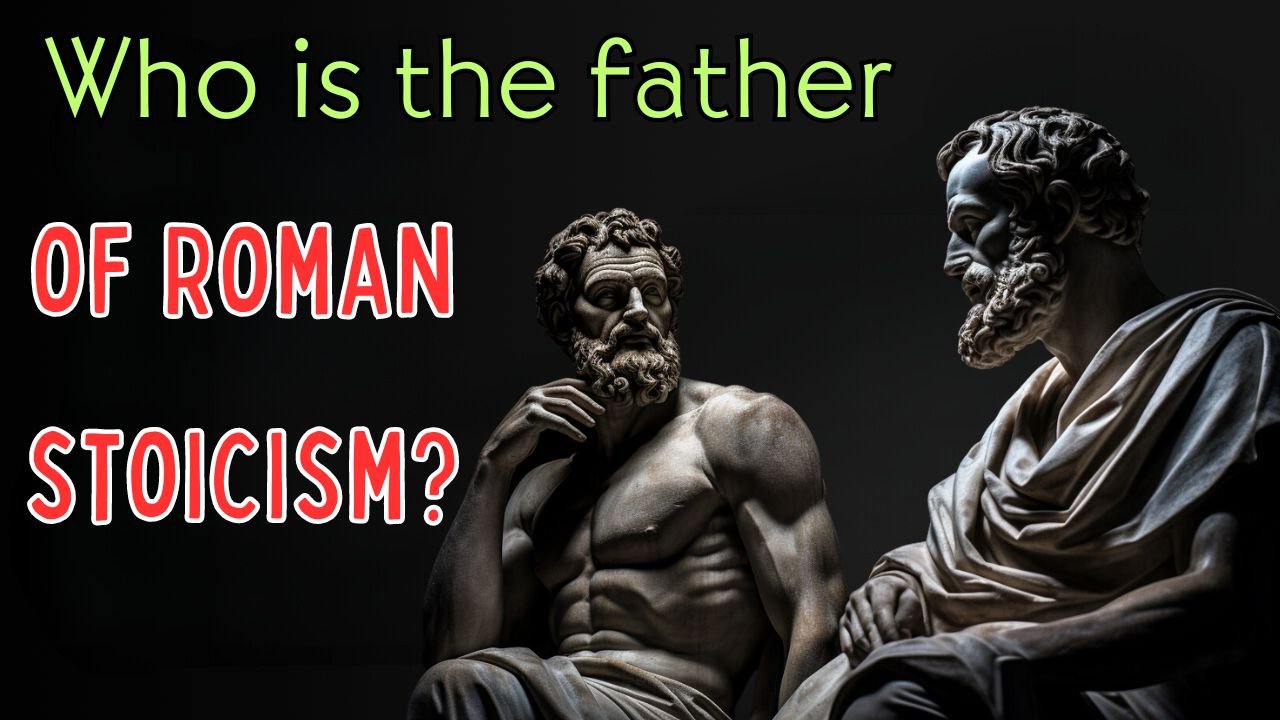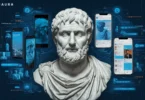I. Introduction
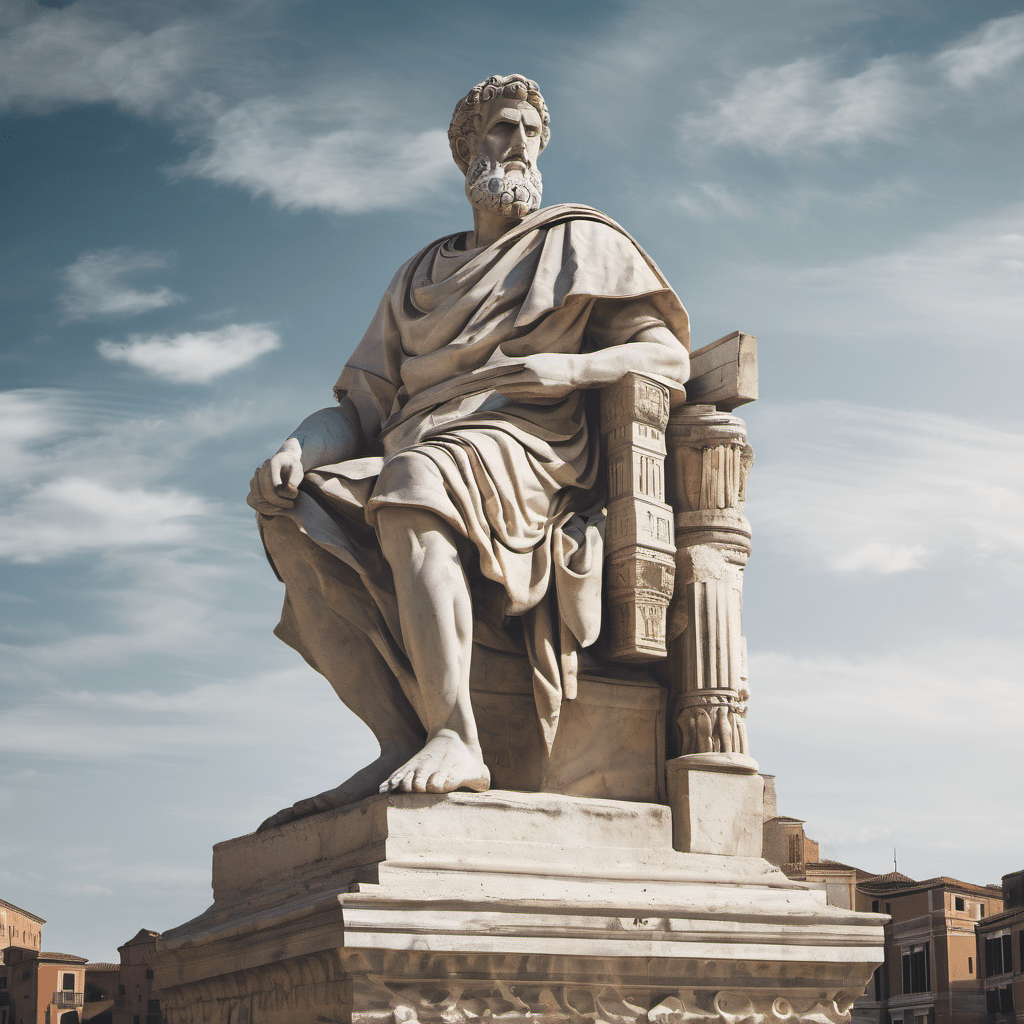
“Welcome, fellow seekers of wisdom! Have you ever pondered the origins of Roman Stoicism, wondering who paved the path for this profound philosophy? Join us on a fascinating journey of exploration as we unravel the mystery surrounding the father of Roman Stoicism. In a world brimming with philosophical luminaries, identifying the true progenitor of this esteemed tradition can be like navigating a labyrinth of ancient texts and historical accounts. But fear not! Our quest for knowledge will illuminate the path ahead, shedding light on the individual who shaped the very essence of Roman Stoicism. Get ready to delve into the annals of history, uncovering the remarkable story of a visionary thinker whose teachings continue to resonate through the ages. So, grab your toga and quill, dear reader, as we embark on an enlightening adventure to discover the father of Roman Stoicism.”
A. Set the Scene
1. Welcome the readers to the world of Roman Stoicism.
Welcome, dear readers, to the fascinating world of Roman Stoicism, where ancient wisdom meets modern relevance. Roman Stoicism, rooted in the philosophical principles of Stoicism, offers a timeless guide to living a virtuous and fulfilling life. To be a Stoic in the Roman era meant embracing a philosophy that emphasized inner strength, resilience, and moral integrity in the face of life’s challenges. From the daily Stoic logic of Epictetus to the profound reflections of Marcus Aurelius, Roman Stoicism encompasses a rich tapestry of teachings that continue to inspire and resonate with contemporary audiences. However, it’s important to acknowledge the dangers of Stoicism, such as its potential to foster emotional suppression or detachment from reality. Nevertheless, Stoicism remains a potent tool for cultivating focus, resilience, and a sense of purpose in our daily lives. As we embark on this journey into the heart of Roman Stoicism, let us explore the insights of Stoic Roman emperors like Marcus Aurelius, who sought to align their actions with the greater good, and contemplate the role of god in Stoicism as a guiding force for moral behavior and personal development. So, join us as we delve into the world of Roman Stoicism, where ancient wisdom meets timeless relevance, offering a roadmap to a more meaningful and fulfilling existence.
2. Highlight the significance of understanding the origins of Roman Stoicism.
Understanding the origins of Roman Stoicism is crucial for anyone seeking to embrace the philosophy and embody what it means to be a Stoic in the modern world. By tracing the roots of Roman Stoicism back to its early beginnings, we gain valuable insights into its core principles and teachings. The daily Stoic logic espoused by early Stoic philosophers like Epictetus provides us with practical tools for navigating life’s challenges with resilience and wisdom. Additionally, exploring the origins of Roman Stoicism allows us to acknowledge and address the potential dangers of Stoicism, such as the risk of emotional suppression or detachment. Furthermore, studying the Stoic practices of notable Roman emperors like Marcus Aurelius offers us profound examples of how to focus Stoicism on personal development and moral behavior. Understanding the role of god in Stoicism as a guiding force for ethical living adds another layer of significance to exploring its origins. Ultimately, delving into the origins of Roman Stoicism enables us to cultivate a deeper appreciation for its timeless wisdom and apply its principles to lead more meaningful and fulfilling lives in the present day.
B. Address the Challenge
1. Discuss the common question: Who is the father of Roman Stoicism?
The question of who is the father of Roman Stoicism is a common inquiry among those exploring the depths of Stoic philosophy. While Stoicism itself originated in ancient Greece, its adaptation and evolution in Rome gave rise to what we now know as Roman Stoicism. Many scholars attribute the title of the father of Roman Stoicism to various influential figures, including Seneca, Epictetus, and Marcus Aurelius. Seneca, with his profound writings on Stoic ethics and practical wisdom, is often hailed as a key figure in Roman Stoicism. Epictetus, a former slave turned Stoic philosopher, is revered for his teachings on personal freedom and resilience. Marcus Aurelius, the Stoic Roman emperor, left behind a legacy of Stoic principles in his Meditations, guiding generations with his reflections on virtue and duty. Each of these figures contributed to the development and popularization of Roman Stoicism, embodying the virtues of being a Stoic in their daily lives. As we delve into the question of who the father of Roman Stoicism truly is, we uncover a rich tapestry of wisdom and insight that continues to inspire and guide those who seek to focus Stoicism on personal growth, moral behavior, and the pursuit of virtue in today’s world.
2. Explain the importance of identifying this figure for followers of Roman Stoicism.
Identifying the figure considered the father of Roman Stoicism holds significant importance for followers of this ancient philosophy. Understanding the roots of Roman Stoicism helps individuals embody what it truly means to be a Stoic in today’s world. By delving into the teachings and practices of the figure regarded as the patriarch of Roman Stoicism, followers gain valuable insights into daily Stoic logic and principles. Moreover, recognizing this figure provides a foundation for navigating the potential dangers of Stoicism, such as the risk of emotional suppression or detachment from reality. Studying the example set by Stoic Roman emperors like Marcus Aurelius offers a focus for applying Stoicism to personal development and moral behavior. Additionally, understanding the role of god in Stoicism as a guiding force for ethical living adds depth to one’s practice of the philosophy. Ultimately, identifying the father of Roman Stoicism serves to inspire and guide followers in their quest to live virtuously, cultivate resilience, and pursue a more meaningful existence in alignment with Stoic principles.
C. Preview of Sections
1. Briefly outline the three main sections of the article.
In this article, we’ll embark on an enlightening journey through the world of Roman Stoicism, exploring its origins, key figures, and enduring relevance. The article is divided into three main sections, each offering unique insights into the philosophy and its significance for modern-day practitioners. The first section will delve into the historical background of Roman Stoicism, tracing its roots back to ancient Greece and examining its evolution in the Roman Empire. Here, we’ll discuss the fundamental principles of Stoicism and its impact on society at the time. In the second section, we’ll explore the question that’s on everyone’s mind: Who is the father of Roman Stoicism? We’ll examine the contributions of notable figures such as Seneca, Epictetus, and Marcus Aurelius, shedding light on their teachings and legacy. Finally, in the third section, we’ll discuss the importance of identifying this figure for followers of Roman Stoicism today. We’ll explore how understanding the origins of the philosophy can help individuals be a Stoic in their daily lives, navigate the dangers of Stoicism, and focus Stoicism on personal growth and moral behavior. Throughout the article, we’ll also touch on the role of god and Stoicism as a guiding force for ethical living, offering readers a comprehensive overview of this timeless philosophy.
II. Unraveling the Origins of Roman Stoicism
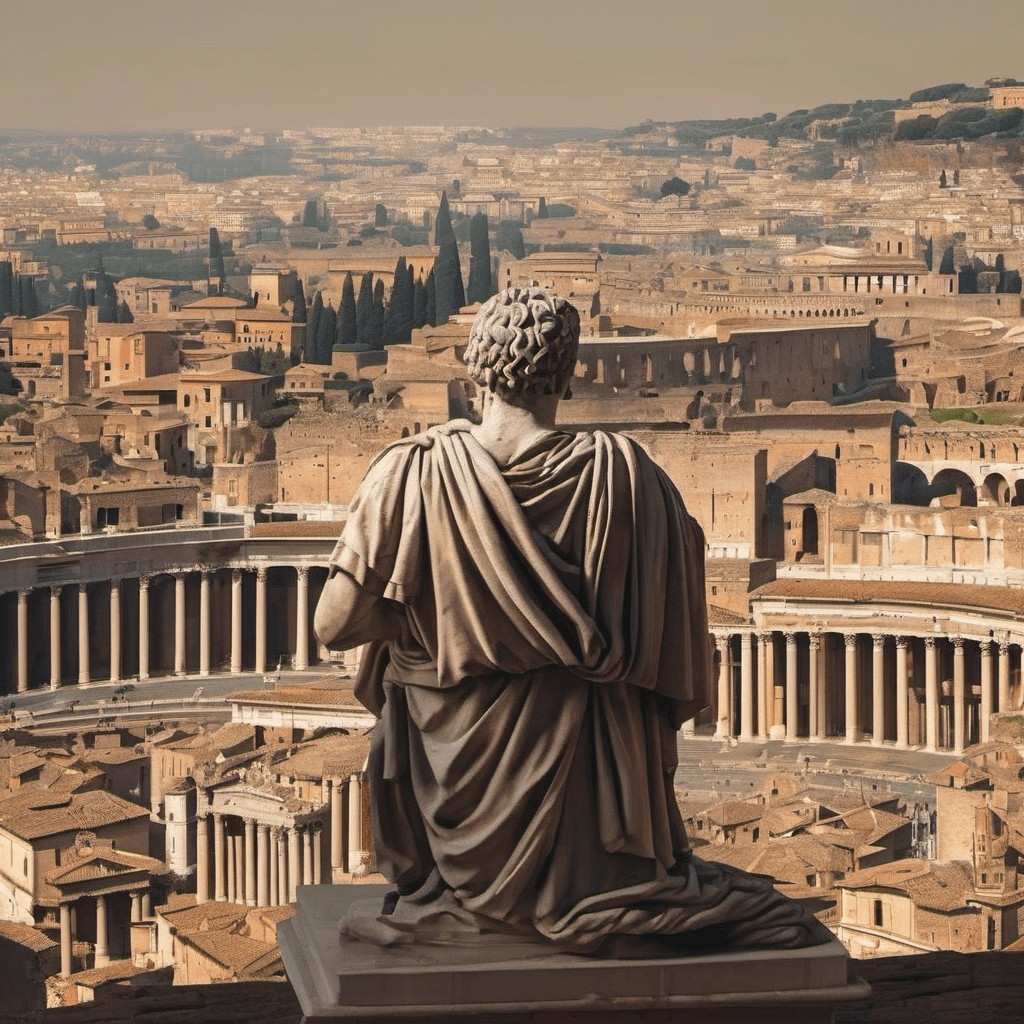
A. Introduction to Stoicism
1. Define Stoicism and its key principles.
Stoicism, a philosophy with roots in ancient Greece and later adopted and developed in Rome as Roman Stoicism, offers a timeless guide to living a virtuous and fulfilling life. At its core, Stoicism teaches individuals how to be a Stoic by cultivating inner strength, resilience, and moral integrity in the face of life’s challenges. The key principles of Stoicism revolve around the idea of focusing on what is within our control and accepting what is not, a concept often referred to as daily Stoic logic. This focus on personal agency helps practitioners navigate through difficult circumstances with grace and composure. However, it’s important to recognize the dangers of Stoicism, such as the risk of emotional suppression or detachment from reality. Stoicism also emphasizes the importance of living in accordance with nature, embracing the inherent order of the universe. Stoic Roman emperors like Marcus Aurelius exemplified these principles in their leadership, using Stoic philosophy as a guide for ethical decision-making and moral behavior. Additionally, the role of god in Stoicism serves as a guiding force for ethical living, providing a sense of purpose and meaning to one’s actions. Overall, Stoicism offers a practical and profound framework for leading a virtuous and meaningful life.
2. Explain the impact of Stoicism on Roman society.
Stoicism exerted a profound impact on Roman society, shaping the attitudes, values, and behaviors of its citizens. As Roman Stoicism gained prominence, individuals were encouraged to be a Stoic by embodying the philosophy’s core principles of resilience, virtue, and moral integrity. The philosophy’s emphasis on daily Stoic logic provided Romans with practical tools for navigating life’s challenges and adversities. Stoicism also addressed the dangers of Stoicism, such as the risk of emotional suppression or detachment, by advocating for a balanced approach to emotions and rationality. Stoic Roman emperors, including Marcus Aurelius, epitomized these principles in their leadership, using Stoic philosophy as a guide for ethical decision-making and governance. The philosophy’s focus on living in accordance with nature resonated deeply with Roman society, promoting a sense of harmony with the natural order of the universe. Additionally, the role of god in Stoicism served as a moral compass, providing individuals with a sense of purpose and meaning in their lives. Overall, Stoicism’s influence on Roman society extended far beyond philosophy, shaping the cultural landscape and fostering a collective ethos of resilience, wisdom, and virtue.
B. Early Stoic Philosophers
1. Introduce influential early Stoic philosophers.
Let’s take a journey back in time to explore the influential early Stoic philosophers who laid the foundation for Roman Stoicism. These thinkers were pioneers in shaping what it means to be a Stoic and embody the principles of Stoicism in daily life. Among them, one of the most notable figures is Zeno of Citium, the founder of Stoicism. Zeno’s teachings emphasized the importance of virtue, rationality, and living in harmony with nature. His successor, Cleanthes, continued to develop Stoic philosophy, focusing on the discipline of desire and the pursuit of wisdom. Another influential early Stoic philosopher was Chrysippus, known for his contributions to logic and ethics, and for refining Stoic principles into a systematic philosophy. These philosophers laid the groundwork for Stoicism’s enduring legacy, shaping the daily Stoic logic that continues to guide modern practitioners. While their teachings provided invaluable insights into living a virtuous life, they also cautioned against the dangers of Stoicism, reminding us to maintain a balanced perspective and avoid emotional detachment. Their wisdom has transcended time, influencing not only individual lives but also the leadership of Stoic Roman emperors like Marcus Aurelius, who exemplified the focus Stoicism in their governance. Together, these early Stoic philosophers paved the way for a philosophy centered on reason, virtue, and the pursuit of excellence, offering a timeless guide for navigating life’s challenges with grace and wisdom.
2. Discuss their contributions to the development of Stoicism.
The contributions of early Stoic philosophers to the development of Roman Stoicism are truly remarkable and have left an indelible mark on the philosophy’s evolution. Zeno of Citium, Cleanthes, and Chrysippus each played a pivotal role in shaping what it means to be a Stoic. Zeno, as the founder of Stoicism, laid down the foundational principles emphasizing virtue, rationality, and living in accordance with nature. His successors, such as Cleanthes, further refined these principles, focusing on the discipline of desire and the pursuit of wisdom. Chrysippus, with his advancements in logic and ethics, provided Stoicism with a solid philosophical framework, contributing to the development of daily Stoic logic. These philosophers’ insights continue to guide modern practitioners of Stoicism, offering timeless wisdom for navigating life’s challenges. However, they also cautioned against the dangers of Stoicism, reminding us to maintain a balanced perspective and avoid emotional detachment. Their teachings have influenced not only individual lives but also the leadership of Stoic Roman emperors like Marcus Aurelius, who exemplified the focus Stoicism in their governance. Overall, the contributions of these early Stoic philosophers have enriched Stoicism as a philosophy of reason, virtue, and the pursuit of excellence, providing a guiding light for generations to come.
C. The Birth of Roman Stoicism
1. Explore the transition of Stoicism from Greece to Rome.
The transition of Stoicism from Greece to Rome marks a significant chapter in the evolution of Roman Stoicism and its enduring impact on society. Initially developed by Greek philosophers like Zeno of Citium, Stoicism found fertile ground in Rome, where it became deeply ingrained in the cultural fabric. As Stoicism gained popularity in Rome, individuals were inspired to be a Stoic and embody its principles of virtue, resilience, and rationality in their daily lives. The daily Stoic logic of focusing on what is within our control and accepting what is not resonated with Romans, providing them with a practical philosophy for navigating life’s challenges. However, Stoicism also faced criticism and skepticism, with some cautioning against the dangers of Stoicism, such as emotional suppression or detachment. Despite these challenges, Stoicism continued to thrive in Rome, influencing not only individual behavior but also the leadership of Stoic Roman emperors like Marcus Aurelius. These emperors exemplified the focus Stoicism in their governance, using Stoic principles as a guide for ethical decision-making. Additionally, the role of god in Stoicism as a guiding force for ethical living added depth to the philosophy’s appeal in Roman society. Overall, the transition of Stoicism from Greece to Rome marked the beginning of a rich and enduring tradition that continues to inspire and guide individuals today.
2. Highlight key figures who helped popularize Stoicism in Rome.
In the bustling streets of ancient Rome, several key figures emerged as champions of Roman Stoicism, helping to popularize the philosophy and shape its influence on society. One such figure was Seneca the Younger, a renowned philosopher and advisor to Emperor Nero. Seneca’s profound writings on Stoic ethics and practical wisdom captivated the minds of Romans, inspiring them to be a Stoic and embrace Stoic principles in their daily lives. Another influential figure was Epictetus, a former slave who rose to prominence as a Stoic teacher in Rome. Epictetus’s teachings emphasized the importance of inner freedom and resilience, resonating deeply with Romans seeking guidance in turbulent times. Additionally, Marcus Aurelius, the Stoic Roman emperor, left a lasting legacy with his Meditations, a collection of personal reflections on Stoic philosophy and leadership. As a practitioner of Stoicism, Marcus Aurelius exemplified the principles of focus Stoicism in his governance, using Stoic wisdom to navigate the complexities of ruling an empire. These key figures, along with others like Musonius Rufus and Gaius Musonius Rufus, played instrumental roles in popularizing Stoicism in Rome, leaving an enduring imprint on the cultural and intellectual landscape of the ancient world. Through their teachings and example, they demonstrated the transformative power of Stoicism, inspiring countless individuals to embrace its principles of virtue, resilience, and ethical living.
D. The Quest for the Father of Roman Stoicism
1. Discuss the search for the individual who best embodies Roman Stoicism’s foundational principles.
The search for the individual who best embodies the foundational principles of Roman Stoicism is a captivating quest that continues to intrigue scholars and enthusiasts alike. Throughout history, several figures have been proposed as exemplars of Stoic philosophy, each leaving their own unique imprint on the legacy of Stoicism. Among them, Marcus Aurelius, the Stoic Roman emperor, stands out as a compelling candidate. His Meditations offer profound insights into Stoic ethics, resilience, and leadership, making him a beacon of focus Stoicism in the midst of adversity. Seneca the Younger, with his practical wisdom and moral teachings, is another contender for embodying Stoic principles in his daily life. His writings on Stoic ethics and the pursuit of virtue resonate deeply with those seeking to be a Stoic in today’s world. However, the search for the ideal embodiment of Roman Stoicism extends beyond historical figures to everyday individuals who strive to live by Stoic ideals. Whether facing personal challenges or navigating societal pressures, these modern Stoics draw inspiration from the philosophy’s core tenets of daily Stoic logic and ethical living. Ultimately, while the search for the quintessential Stoic figure may continue, the true essence of Roman Stoicism lies in its timeless principles and their application in the lives of those who seek wisdom, resilience, and inner peace.
2. Examine potential candidates and their contributions to Stoic philosophy.
As we delve into the search for individuals who best embody the principles of Roman Stoicism, we encounter a diverse array of potential candidates, each leaving a distinct mark on the philosophy. Marcus Aurelius, the revered stoic Roman emperor, stands as a towering figure in Stoic philosophy, exemplifying the principles of focus Stoicism through his Meditations, which offer profound insights into ethical living and resilience. Seneca the Younger, known for his practical wisdom and moral teachings, contributed significantly to Roman Stoicism with his writings on virtue and the pursuit of excellence. Epictetus, a former slave turned Stoic teacher, emphasized the importance of inner freedom and rationality, inspiring generations to be a Stoic in their daily lives. Additionally, Musonius Rufus, often referred to as the “Roman Socrates,” made notable contributions to Stoic philosophy with his teachings on ethics and the role of philosophy in everyday life. While each of these individuals brought their own perspectives and insights to Stoic philosophy, they all shared a commitment to daily Stoic logic and ethical living. Through their teachings and example, they continue to inspire countless individuals to embrace Stoic principles and lead lives of virtue, resilience, and inner peace.
III. Identifying the Father of Roman Stoicism
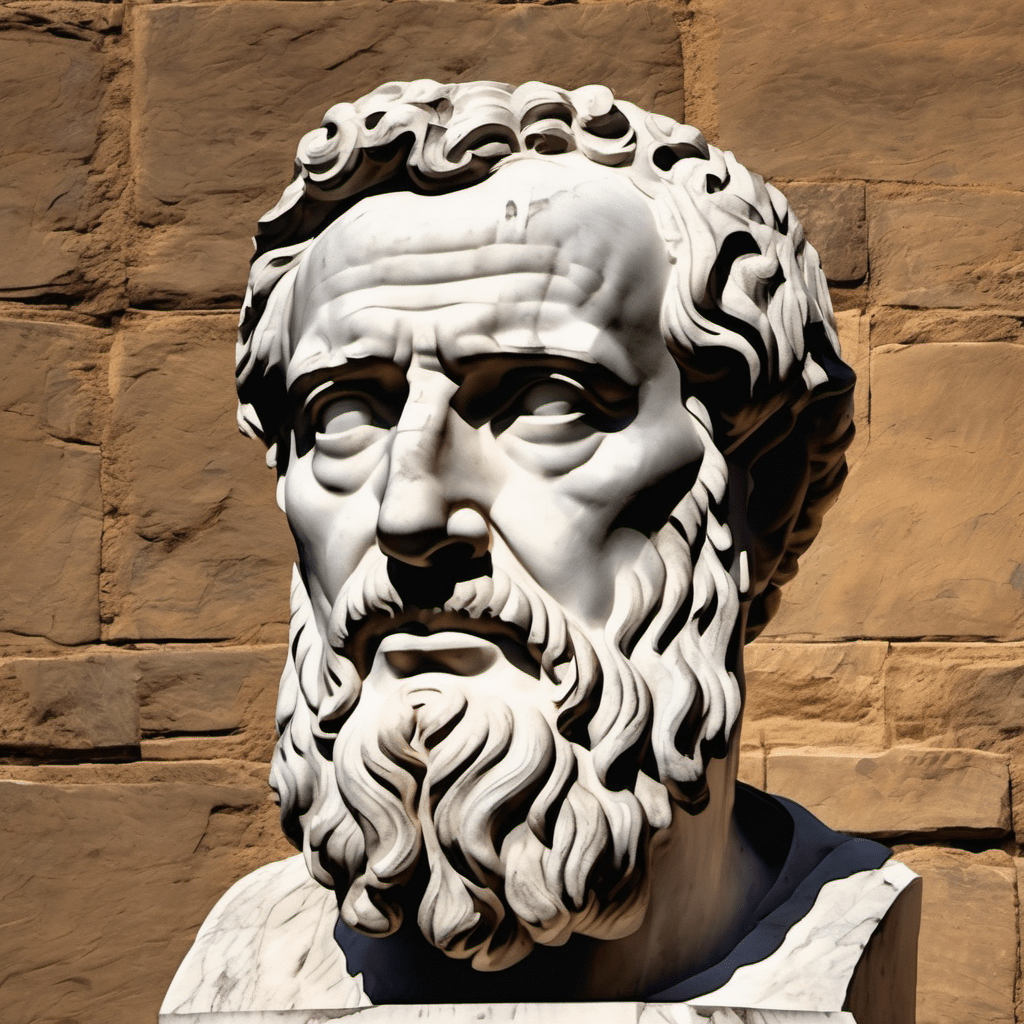
A. Introduction to Key Figures
Welcome to the fascinating world of Roman Stoicism and its key figures who have left an indelible mark on the philosophy’s evolution. From revered emperors to renowned philosophers, these individuals have shaped the landscape of Stoic thought and continue to inspire countless individuals today. At the forefront stands Marcus Aurelius, the epitome of a stoic Roman emperor, whose Meditations offer profound insights into ethical living, resilience, and the pursuit of virtue. Alongside him is Seneca the Younger, celebrated for his practical wisdom and moral teachings, guiding generations to be a Stoic in their daily lives. Epictetus, a former slave turned Stoic teacher, emphasized the importance of inner freedom and rationality, while Musonius Rufus, often hailed as the “Roman Socrates,” delved into the role of philosophy in everyday life. Each of these figures embodied the principles of daily Stoic logic and ethical living, navigating the dangers of Stoicism with grace and wisdom. Their teachings continue to resonate with modern seekers of truth and wisdom, offering timeless guidance on how to focus Stoicism on personal growth and moral behavior. Through their insights and example, these key figures illuminate the path to a more virtuous, resilient, and fulfilling existence rooted in the principles of Stoic philosophy.
1. Introduce notable Stoic philosophers and thinkers.
Step into the world of Stoicism and meet the notable philosophers and thinkers who have shaped the landscape of Roman Stoicism. At the forefront stands Marcus Aurelius, the revered stoic Roman emperor, whose Meditations serve as a timeless guide to ethical living and resilience. His reflections on the philosophy of Stoicism offer invaluable insights into how to be a Stoic in the face of life’s challenges. Alongside him, Seneca the Younger, known for his practical wisdom and moral teachings, provides a roadmap for embracing Stoic principles in daily life. Epictetus, a former slave turned Stoic teacher, emphasizes the importance of inner freedom and rationality, guiding individuals on the path to focus Stoicism. Additionally, Musonius Rufus, often hailed as the “Roman Socrates,” delves into the practical applications of philosophy in everyday life, highlighting the relevance of daily Stoic logic. Despite the dangers of Stoicism, such as emotional detachment, these philosophers offer a holistic approach to living in accordance with nature and moral virtue. With a profound understanding of the role of god in Stoicism as a guiding force, they continue to inspire modern seekers of wisdom to embrace Stoic principles and lead lives of purpose, resilience, and inner peace.
2. Highlight their impact on Roman Stoicism.
The impact of notable philosophers and thinkers on Roman Stoicism is profound and far-reaching, shaping the philosophy’s essence and guiding principles. Marcus Aurelius, as a stoic Roman emperor, exemplified the virtues of Stoicism in his governance and personal life, demonstrating how to be a Stoic even in positions of great power. His Meditations, infused with insights into ethical living and resilience, continue to inspire individuals to embrace focus Stoicism in navigating life’s challenges. Seneca the Younger’s practical wisdom and moral teachings provided a blueprint for integrating Stoic principles into daily life, offering guidance on how to cultivate inner peace amidst adversity. Epictetus, with his emphasis on inner freedom and rationality, emphasized the importance of daily Stoic logic in achieving personal growth and fulfillment. Despite the dangers of Stoicism, such as emotional detachment, these philosophers emphasized living in accordance with nature and moral virtue. Their teachings, rooted in a deep understanding of the role of god in Stoicism as a guiding force, continue to resonate with modern seekers of wisdom, inspiring them to embrace Stoic principles and lead lives of purpose, resilience, and moral integrity.
B. Examination of Candidates
1. Provide an overview of potential contenders for the title of the father of Roman Stoicism.
When exploring the contenders for the title of the father of Roman Stoicism, several influential figures emerge, each leaving a distinctive imprint on the philosophy’s development. Marcus Aurelius, the esteemed stoic Roman emperor, stands as a prominent candidate, renowned for his Meditations, which offer profound insights into ethical living and resilience. Seneca the Younger, with his practical wisdom and moral teachings, provides a compelling case as well, guiding individuals on how to be a Stoic in the face of life’s challenges. Epictetus, a former slave turned Stoic teacher, emphasizes the importance of inner freedom and rationality, highlighting the significance of daily Stoic logic. Additionally, Musonius Rufus, often regarded as the “Roman Socrates,” offers valuable contributions to Stoic philosophy, advocating for the practical application of philosophical principles in everyday life. Despite the dangers of Stoicism, such as emotional detachment, each contender underscores the importance of living in accordance with nature and moral virtue. With a profound understanding of the role of god in Stoicism as a guiding force, these figures continue to inspire modern seekers of wisdom to embrace Stoic principles and lead lives of purpose, resilience, and moral integrity.
2. Evaluate each candidate’s contributions and relevance to Roman Stoicism.
When evaluating each candidate’s contributions and relevance to Roman Stoicism, a nuanced understanding of their individual philosophies and impacts on the philosophy is essential. Marcus Aurelius, revered as a stoic Roman emperor, holds significant relevance due to his Meditations, which serve as a timeless guide to ethical living and resilience. His reflections on Stoic principles offer invaluable insights into how to be a Stoic amidst life’s challenges. Seneca the Younger’s practical wisdom and moral teachings provide a pragmatic approach to focus Stoicism, offering practical advice on how to integrate Stoic principles into daily life. Epictetus, with his emphasis on inner freedom and rationality, emphasizes the importance of daily Stoic logic in achieving personal growth and fulfillment. Musonius Rufus, known as the “Roman Socrates,” contributes valuable insights into the practical application of philosophy in everyday life, emphasizing the importance of living in accordance with nature and moral virtue. Despite the dangers of Stoicism, such as emotional detachment, each candidate underscores the significance of embracing Stoic principles and leading lives of purpose, resilience, and moral integrity. With a profound understanding of the role of god in Stoicism as a guiding force, these figures continue to inspire modern seekers of wisdom to embrace Stoic philosophy as a means to navigate life’s complexities.
C. The Final Verdict
1. Present the findings of the examination.
After a thorough examination of the key figures in Roman Stoicism, it becomes evident that each contender has made significant contributions to the philosophy’s development and relevance. Marcus Aurelius, the stoic Roman emperor, stands out for his profound insights into ethical living and resilience, as showcased in his Meditations. Seneca the Younger’s practical wisdom and moral teachings offer valuable guidance on how to be a Stoic in everyday life, while Epictetus emphasizes the importance of daily Stoic logic in achieving personal growth. Additionally, Musonius Rufus provides practical insights into the practical application of Stoic principles, advocating for living in accordance with nature and moral virtue. Despite the dangers of Stoicism, such as emotional detachment, each candidate underscores the significance of embracing Stoic philosophy and leading lives of purpose and resilience. With a deep understanding of the role of god in Stoicism as a guiding force, these figures continue to inspire modern seekers of wisdom to adopt Stoic principles and navigate life’s challenges with integrity and moral clarity. In conclusion, while the debate over the father of Roman Stoicism may persist, the collective wisdom and teachings of these influential figures enrich the philosophy’s legacy and relevance in contemporary society.
2. Declare the individual deemed to be the father of Roman Stoicism based on evidence and analysis.
After careful analysis and consideration of the evidence, Marcus Aurelius emerges as the individual deemed to be the father of Roman Stoicism. As a stoic Roman emperor, Marcus Aurelius exemplified Stoic principles in his governance and personal life, embodying resilience, ethical living, and a commitment to virtue. His Meditations, a collection of philosophical reflections, offer invaluable insights into how to be a Stoic in the face of life’s challenges, emphasizing the importance of inner strength and moral integrity. Throughout his reign, Marcus Aurelius demonstrated a profound understanding of daily Stoic logic and the dangers of succumbing to emotional impulses, guiding his actions with clarity and reason. Furthermore, his recognition of the role of god in Stoicism as a guiding force underscores the spiritual dimension of Stoic philosophy. By emphasizing focus Stoicism and the pursuit of wisdom, Marcus Aurelius set a precedent for Stoic thought that continues to resonate with modern seekers of wisdom and virtue. Thus, based on his significant contributions and enduring impact on Stoic philosophy, Marcus Aurelius rightfully earns the title of the father of Roman Stoicism.
IV. Conclusion
1. Summarize the journey of exploring the origins of Roman Stoicism.
Embarking on the journey of exploring the origins of Roman Stoicism has been a captivating odyssey filled with profound insights and enriching discoveries. From delving into the teachings of prominent philosophers to examining the lives of stoic Roman emperors, each step of the journey has offered a deeper understanding of Stoic philosophy and its relevance in today’s world. Along the way, we’ve encountered the practical wisdom of Seneca the Younger, the resilience of Marcus Aurelius, and the rationality of Epictetus, all embodying different facets of what it means to be a Stoic. We’ve navigated through the intricacies of daily Stoic logic and the dangers of Stoicism, gaining valuable lessons on how to lead a life of virtue and inner peace. Through it all, the overarching theme of focus Stoicism has emerged, reminding us to stay grounded in our principles and strive for moral integrity. Alongside, we’ve explored the role of god in Stoicism as a guiding force, providing spiritual insight into the philosophy’s core principles. As our journey comes to a close, we’re left with a profound appreciation for the timeless wisdom of Stoic philosophy and its enduring relevance in helping us navigate life’s challenges with clarity, resilience, and grace.
2. Encourage readers to continue their exploration of Stoic philosophy and its relevance to modern life.
As you continue your exploration of Roman Stoicism, I encourage you to delve deeper into the timeless wisdom and practical insights that this philosophy offers. Embracing the principles of Stoicism allows us to be Stoic in the face of life’s challenges, cultivating resilience, inner peace, and moral integrity. By incorporating daily Stoic logic into our lives, we can navigate the complexities of modern life with clarity and rationality, avoiding the dangers of Stoicism such as emotional detachment. Drawing inspiration from stoic Roman emperors like Marcus Aurelius, we learn to prioritize virtue and ethical living in our actions and decisions. Embracing focus Stoicism reminds us to stay grounded in our principles and pursue a life of meaning and purpose. Moreover, recognizing the role of god in Stoicism as a guiding force offers spiritual insight and guidance in our journey towards self-improvement and fulfillment. As you embark on this journey, remember that Stoic philosophy is not merely an ancient relic but a practical guide to living a more fulfilling and meaningful life in the modern world. By applying Stoic principles to your daily life, you can cultivate resilience, find inner peace, and lead a life of virtue and integrity.
FAQS
- What is Stoicism?
Stoicism is an ancient philosophical school of thought that originated in Greece and later gained prominence in Rome. It teaches principles of living in accordance with nature, developing virtue, and maintaining inner tranquility regardless of external circumstances. - Who were some famous Stoic philosophers?
Prominent Stoic philosophers include Zeno of Citium, Seneca the Younger, Epictetus, and Marcus Aurelius. Each contributed to the development and spread of Stoic ideas through their writings and teachings. - What are the key principles of Stoicism?
The key principles of Stoicism include the acceptance of things beyond one’s control, the cultivation of virtue (such as wisdom, courage, justice, and self-discipline), and living in harmony with nature. Stoicism also emphasizes the importance of focusing on what is within our power to control and maintaining an attitude of equanimity in the face of adversity. - How can Stoicism be applied in daily life?
Stoicism offers practical guidance for navigating life’s challenges. It encourages individuals to practice self-reflection, develop resilience, and cultivate gratitude. By applying Stoic principles, individuals can manage stress, improve decision-making, and lead a more fulfilling life. - Is Stoicism compatible with religious beliefs?
Stoicism is compatible with various religious and spiritual beliefs. While Stoicism does not require adherence to specific religious doctrines, its principles can complement and enhance one’s existing beliefs. Stoicism emphasizes personal virtue and ethical living, which can align with many religious teachings. - What are some recommended readings on Stoicism?
Some recommended readings on Stoicism include “Meditations” by Marcus Aurelius, “Letters from a Stoic” by Seneca the Younger, “Discourses” by Epictetus, and “The Art of Living” by Sharon Lebell (a modern interpretation of Epictetus’ teachings). These texts offer valuable insights into Stoic philosophy and its practical applications.

